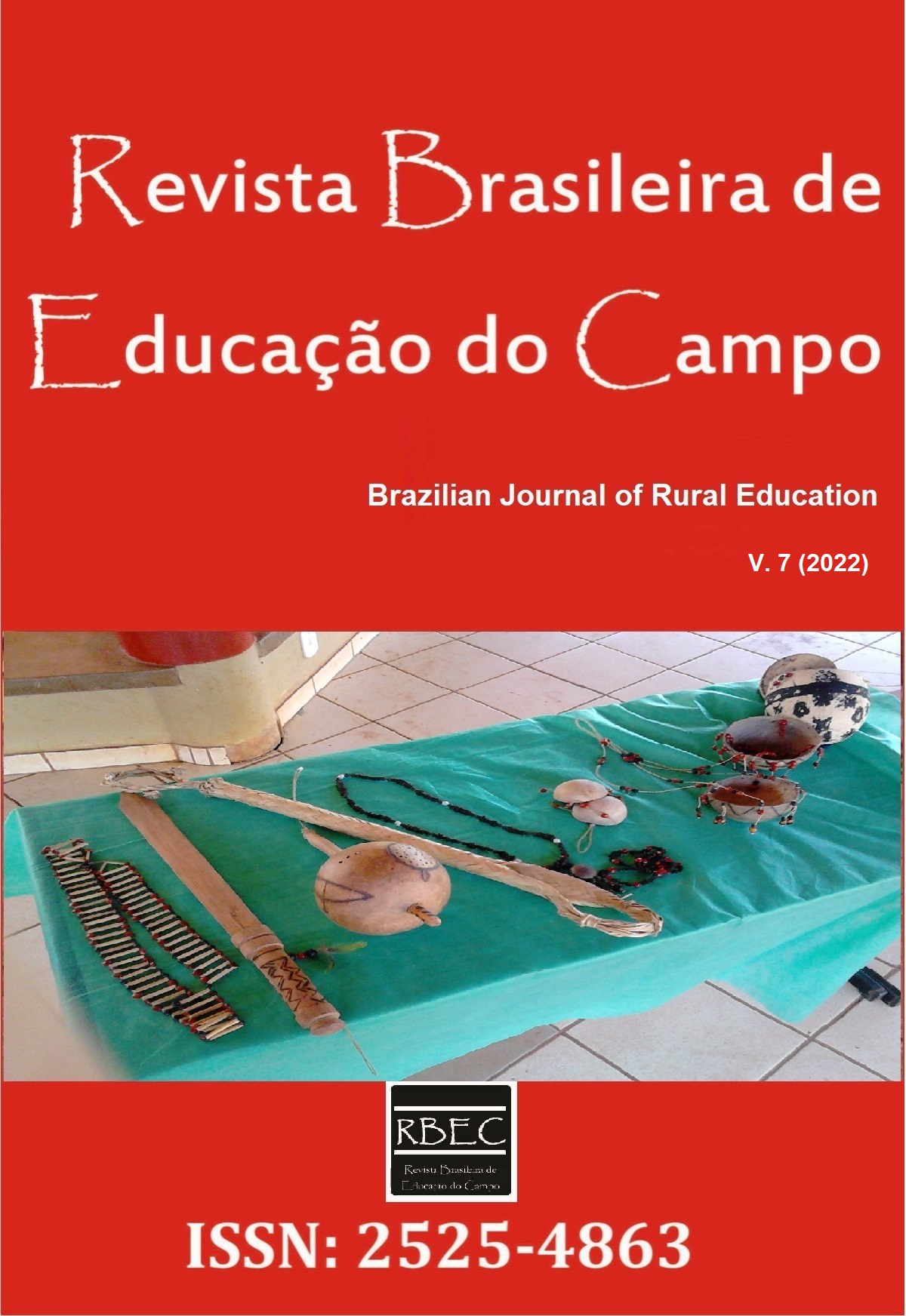Educational inequalities in the rural milieu: a study on the racial impacts in Brazil and in the state of Mato Grosso
DOI :
https://doi.org/10.20873/uft.rbec.e12826Résumé
ABSTRACT. This article aims at analyzing the impact of racial inequality in the initial and final stages of school education of farming producers both in the state of Mato Grosso and Brazil. The main data source of this research is the 2017’s Agricultural Census. It portrays the state of affairs in Brazil’s rural life, such as education and race relations, allowing a critical perspective upon such aspects of the rural context. Thus, this article strives to address the following question: “What does the 2017’s Agricultural Census reveal about racial inequalities in the initial and final stages of school education of farmers in the state of Mato Grosso and Brazil?”. To answer this question, the following variables were analyzed: agricultural establishments, producers, race or skin color, literacy level and college education. The research design was based in a quantitative and qualitative approach, underscored by the theoretical framework of Paulo Freire, Miguel Arroyo, Carlos Hasenbalg and Nelson do Valle Silva. The analysis corroborates the persistence of profound inequalities by demonstrating that the majority of favorable indicators benefits the white population, while the majority of the unfavorable is comprised by black people.
Téléchargements
Références
Arroyo, M. G., & Fernandes, B. M. (1999). A Educação Básica e o Movimento Social do Campo. Brasília: Articulação Nacional por Uma Educação Básica do Campo. Coleção por Uma Educação Básica do Campo, 2. Recuperado de http://portal.mec.gov.br/secad/arquivos/pdf/educacaodocampo/edbasicapopular.pdf
Cavichiolli, M. H. F. (2016). A expansão do acesso ao ensino superior no Estado de Mato Grosso – 1991 a 2010: mudanças ou permanências? (Dissertação de Mestrado). Universidade Federal de Mato Grosso, Mato Grosso.
Ferraro, A. R. (2012). Alfabetização rural no Brasil na perspectiva das relações campo-cidade e de gênero. Educação & Realidade, 37(1), 943–967. https://doi.org/10.1590/S2175-62362012000300013
Freire, P. (1989). A importância do ato de ler: em três artigos que se completam. São Paulo: Editora Cortez.
Freire, P. (2010). Pedagogia do oprimido. Rio de Janeiro: Editora Paz e Terra.
Hasenbalg, C. (2003). A Distribuição de Recursos Familiares. In Hasenbalg, C., & Valle Silva, N. (Orgs.). Origens e Destinos – Desigualdades sociais ao longo da vida (pp. 55-83). Rio de Janeiro: Topbooks.
IBGE. Instituto Brasileiro de Geografia e Estatística. (2021). Censo Agropecuário. https://www.ibge.gov.br/estatisticas/economicas/agricultura-e-pecuaria/21814-2017-censo-agropecuario.html?=&t=o-que-e
IBGE. Instituto Brasileiro de Geografia e Estatística. (2017a). Censo Agro 2017. https://censos.ibge.gov.br/agro/2017/
IBGE. Instituto Brasileiro de Geografia e Estatística. (2017b). Manual do Recenseador 2017. Censo Agro 2017. https://censos.ibge.gov.br/agro/2017/divulgacao-censo-agro-2017/midia-online.html?view=mediaibge&catid=2199&id=1056
IBGE. Instituto Brasileiro de Geografia e Estatística. (2017c). Questionário. Censo Agro 2017. https://censos.ibge.gov.br/agro/2017/downloads/censoagro2017/Quest_Censo_Agro_2017_Valores_10042017.pdf
IBGE. Instituto Brasileiro de Geografia e Estatística. (2017d). Pesquisa Nacional por Amostra de Domicílios Contínua. https://www.ibge.gov.br/estatisticas/sociais/trabalho/9171-pesquisa-nacional-por-amostra-de-domicilios-continua-mensal.html?=&t=o-que-e
Mueller, C. C. (2014). O Censo Agro: complexa operação que vem ajudando a desvendar a realidade da agropecuária brasileira. In Senra, N. C. (Org.). O Censo entra em campo: o IBGE e a história dos recenseamentos agropecuários (pp. 13-22). Rio de Janeiro: IBGE, Centro de Documentação e Disseminação de Informações.
Ribeiro, C. A. C. (2003). Estrutura de classes, condições de vida e oportunidades de mobilidade social no Brasil. In Hasenbalg, C., & Valle Silva, N. (Orgs.). Origens e Destinos – Desigualdades sociais ao longo da vida (pp. 381-430). Rio de Janeiro: Topbooks.
SIDRA. Sistema IBGE de Recuperação Automática. Banco de Tabela Estatísticas. https://sidra.ibge.gov.br/home/pms/brasil
Urrutia, C. G. (1952). Analfabetismo en América [Analfabetismo na América]. Guatemala: Ministério da Educación Pública.
Valle Silva, N. (2003). Expansão escolar e estratificação educacional no Brasil. In Hasenbalg, C., & Valle Silva, N. (Orgs.). Origens e Destinos – Desigualdades sociais ao longo da vida. (pp. 105-146). Rio de Janeiro: Topbooks.
Vasconi, T. A., & Reca, I. C. (1967). El analfabetismo como fenómeno estructural y las perspectivas de una campaña nacional de alfabetización [O analfabetismo como fenômeno estrutural e as perspectivas de uma campanha nacional de alfabetização]. América Latina, 10(2), 71-120.
Téléchargements
Publié-e
Comment citer
Numéro
Rubrique
Licence
Proposal for Copyright Notice Creative Commons
1. Policy Proposal to Open Access Journals
Authors who publish with this journal agree to the following terms:
A. Authors retain copyright and grant the journal right of first publication with the work simultaneously licensed under the Creative Commons Attribution License that allows sharing the work with recognition of its initial publication in this journal.
B. Authors are able to take on additional contracts separately, non-exclusive distribution of the version of the paper published in this journal (ex .: publish in institutional repository or as a book), with an acknowledgment of its initial publication in this journal.
C. Authors are permitted and encouraged to post their work online (eg .: in institutional repositories or on their website) at any point before or during the editorial process, as it can lead to productive exchanges, as well as increase the impact and the citation of published work (See the Effect of Open Access).














